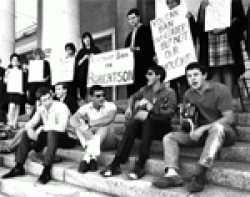
Published date
6 June 1966
On 6 June 1966, Robert Kennedy, the brother of former American president John F. Kennedy and American politician, made a parliamentary address at the University of Cape Town (UCT). This was called the 'Day of Affirmation Address'. Kennedy visited UCT at the invitation of liberal student movement National Union of South African Students(NUSAS). In his speech he referred to a 'Day of Affirmation' or a 'celebration of liberty', and compared racial inequality and prejudice in the United States and South Africa. In his speech he appealed to the youth to take charge of their country's future, and stated that: "Our answer is the world's hope; it is to rely on youth. The cruelties and the obstacles of this swiftly changing planet will not yield to obsolete dogmas and outworn slogans. It cannot be moved by those who cling to a present which is already dying, who prefer the illusion of security to the excitement and danger which comes with even the most peaceful progress. This world demands the qualities of youth: not a time of life but a state of mind, a temper of the will, a quality of imagination, a predominance of courage over timidity, of the appetite for adventure over the life of ease..." His appeal for the empowerment of the youth became a reality, and this movement culminated almost exactly a decade later on 16 June 1976, when students in Soweto protested against Afrikaans as a compulsory medium of instruction in schools. This protest is known as the Soweto Uprising and the date is now commemorated as public holiday called Youth Day (16 June).
References
Kennedy, R.F., Robert F. Kennedy University of Cape Town, South Africa
N.U.S.A.S. "Day of Affirmation" Speech June 6th, 1966 ,[online]Available at www.rfksafilm.org [Accessed:4 June]